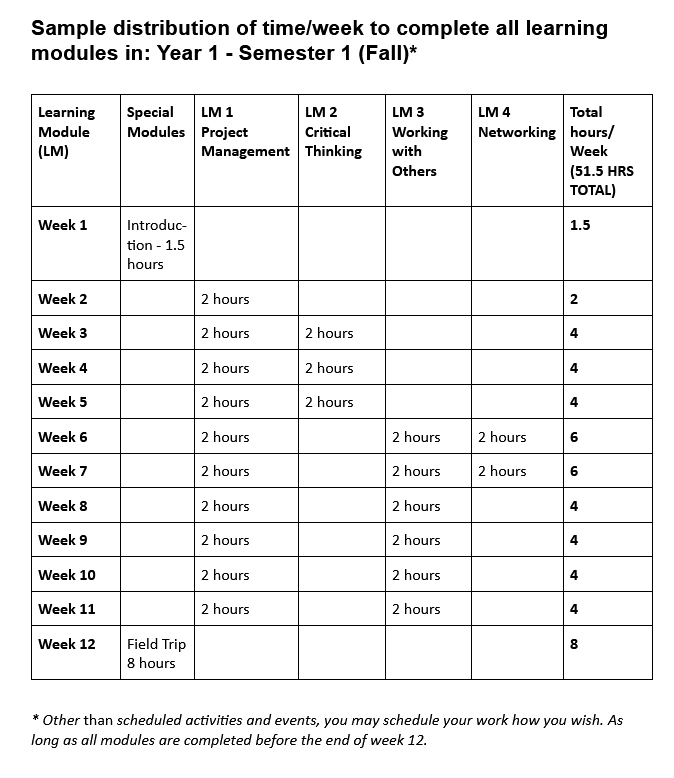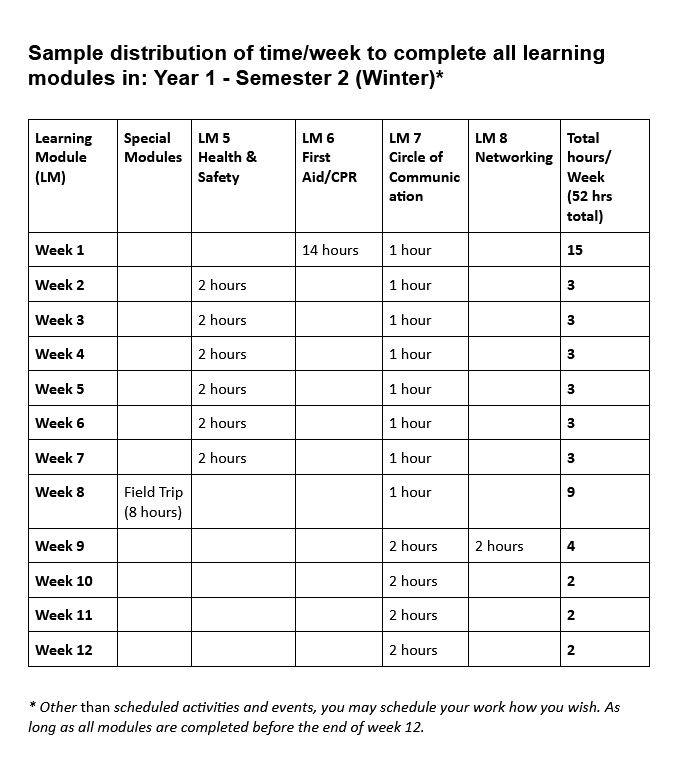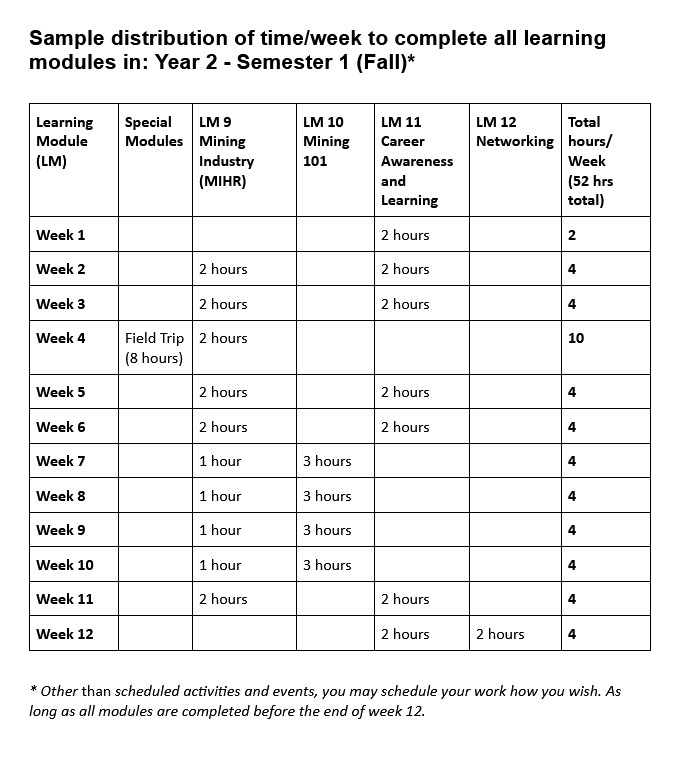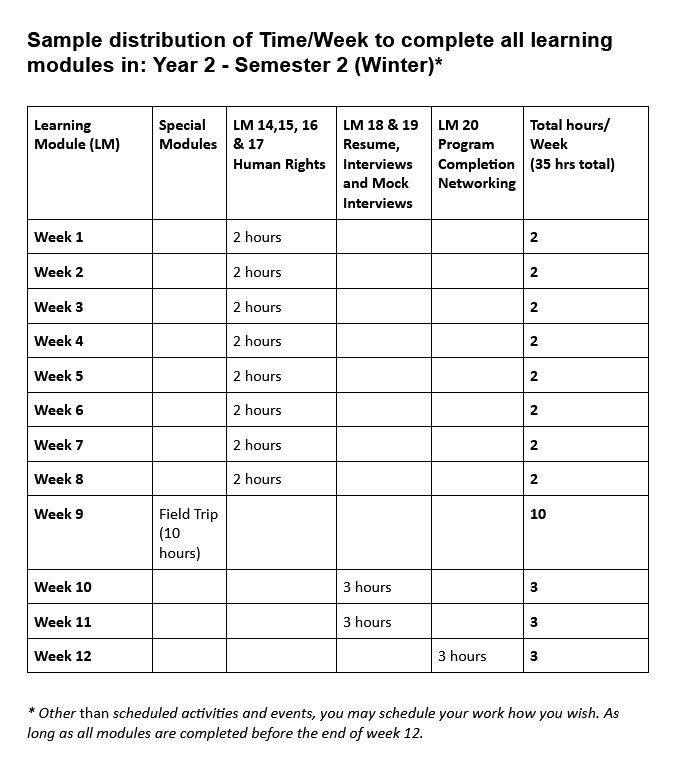
Program Outline
Producing Leaders in the
Sustainable Development of Mineral Resources
The Mineral Resources Leadership Certificate is a multi-disciplinary, essential skills and workplace readiness program offered by the Goodman School of Mines. Learning modules and experiences are completed synchronously with the students’ degree, during four academic semesters (Fall & Winter). A cohort of 30 undergraduate and graduate students and 10 industry professionals are selected from programs at Laurentian University that may lead to careers in the mineral resources industry. The certificate program features a very unique and experiential learning environment and responds directly to the essential skills and knowledge needs indicated by industry employers. Multiple field trips, networking events, one on one industry mentorship, and opportunities to interact with industry professionals and obtain industry recognized certifications are key components of this “once in a lifetime” learning experience.
Program Overview at a Glance
Semester One (September 2023)
- Introduction
- Project Management Essentials
- Critical Thinking Skills
- Working With Others
- Field Trip #1 – Dynamic Earth & Mining Business Presentation
- Networking 101 – TBD
- Program Launch & Networking Event
Semester Two (January 2024)
- Health and Safety Courses
- Standard First Aid & CPR Training
- The Circle of Communication
- Networking Event – TBD
- Field Trip #2 – NORCAT Facility and Mine Tour
Semester Three (September 2024)
- Learning About Mining
- Mining 101
- Career Awareness and Continuous Learning
- Field Trip #3 – Environment/Geology Trip
- Networking Event – TBD
Semester Four (January 2025)
- Racism, Racial Discrimination and Human Rights
- Intercultural Awareness Training
- Gender Equity
- Indigenous Awareness Training
- Towards Sustainable Mining
- Field Trip #4 – Indigenous Activity
- Resume, Interview Skills and Networking for Job Search
- Mock Interviews
- Program Completion Celebration & Networking Event
Semester One (Fall)
- Learning Module 1 - Project Management Essentials
- Learning Module 2 - Critical Thinking Skills
- Learning Module 3 - Working with Others
- Learning Module 4 - Networking and Program Launch Networking Event
- Field Trip #1 - Dynamic Earth and a Business in Mining
- Sesmester One - Sample Distribution of Time to Complete All Learning Modules
Module 1 - Project Management Essentials (Approx. 20 Hours)
In Partnership with Procept Associates LTD.
This self-directed online short-course from Procept Associates Ltd. is a hands-on journey through a project from initiation to closing, with a special emphasis on initiation and planning. Course participants practice using project management tools and techniques while they experience the realistic challenges that are encountered on projects. The course focuses on developing practical skills that can be applied immediately to increase the level of success on projects.
This fun course consists of a series of videos and short offline activities for participants to complete at their own pace. Based on years of experience, the instructor inserts stories, illustrations and other examples to make the material relevant. The course uses two cases studies so participants can practice the tools they have learned on projects facing challenges similar to the ones they will face in their real-life work environment. The course includes sample answers for the exercises; pointing out best practices and also areas for improvement. There are also activities where the learners are encouraged to apply the new tools and techniques to one of their own real-life projects. Each course module tests for comprehension with true/false questions or fill-in-the-blank type exercises. Students will receive a Project Management Essentials Certificate from Procept Associates after completing this course.
LEARNING OBJECTIVES
Participants will gain practical skills to:
- Use the terminology and processes of modern project management
- Prepare a complete and accurate project plan for a project
- Facilitate team discussions to learn from the PM experiences of others
- Practice project management skills using templates
- Value the benefits of a consistent project management methodology
Module 2 - Critical Thinking Skills (Approx. 4-6 hours)
In Partnership with Mining Industry Human Resources Council (MIHR)
In this module, adapted from the Mining Industry Human Resources Council (MIHR), students will learn critical thinking skills such as how to: 1) make effective decisions; 2) demonstrate effective problem-solving problems; 3) plan time and schedule; and 4) memorize essential information.
LEARNING OBJECTIVES
- Make effective decisions
By applying a decision-making process to determine the best course of action; explaining and justifying decision processes; and learning how to make effective decisions, where authorized.
- Demonstrate effective problem-solving
By identifying problems; assessing problem situations; identifying steps needed to address problems; describing a model for problem solving; applying the problem-solving process to case studies related to mining situations.
- Plan time and schedule
By estimating time required to complete a task or assignment; identifying demands on time; prioritizing tasks; coordinating with others to complete a task or assignment; managing time efficiently.
- Memorize essential information
By remembering key and emergency information related to your industry; remembering codes used regularly (passwords, employee number, equipment models).
Module 3 - Working with Others (Approx. 10-12 hours)
In Partnership with Mining Industry Human Resources Council (MIHR)
In this module, adapted from the Mining Industry Human Resources Council (MIHR), students will learn about: 1) their personal responsibilities such as identifying workplace norms and meeting expectations of the workplace; and 2) how to effectively work with others by working as a team member, respecting cultural differences, participating in team meetings and contributing to a positive work environment.
LEARNING OBJECTIVES
Demonstrate Responsibility
- Identify workplace norms
- Identify and recognize workplace cultural norms and differences (eg: use of eye contact, tone of voice, speech patterns, use of language, etc.)
- Meet expectations of workplaces
- Know policies and procedures, perform tasks as outlined in policies and procedures.
Demonstrate Ability to Work with Others
- Work as a member of a team
Ask questions to clarify responsibiities and expectations, deal with conflict appropriately, respect the opinion and feelings of other team members, be open to the thoughts and opinions of others, work cooperatively to accomplish a common goal or task, contribute to a team by sharing information and expertise, don’t assume others already know, show respect to employer, manager, supervisors and coworkers, exercise “give and take” to achieve team results. - Respect cultural differences
Recognize that people view things from different perspectives, recognize behaviors that reflect the different perspectives, identify common assumptions, recognize the right of all workers to be free from discrimination, identify ways of responding to discrimination in the workplace. - Participate in team meetings
Be punctual and prepared, offer suggestions and opinions, take notes on important topics. - Contribute to a positive work environment
Respect the opinions of other workers, use language that is appropriate to the workplace, express emotions appropriately, understand and follow protocols for resolving conflicts or problems.
Module 4 - Networking & Program Launch Networking Event (Approx. 4 hours)
In this module, students will learn about the art of networking in a professional environment by mastering how to: respectfully communicate with professionals in the industry, ask questions, be aware of their body language and dress appropriately for the events that they are attending. Students will attend the program launch networking event and practice their skills. A self-evaluation and reflection journal will be completed and revisited in the following semesters to measure improvements.
Field Trip #1 - Dynamic Earth and a Business in Mining (8 hours)
In Partnership with Dynamic Earth
This one-day field trip will enlighten students about Sudbury’s geological, environmental and mining history and introduce current and future industry innovations. Students will visit the Dynamic Earth Science Center for hands-on, interactive learning and activities. They will descend into the underground mine and see how mining then and now has changed dramatically and how new technologies and innovations are being used. Students will also hear from a professional who owns a local business that services the mining industry, learn about their company’s role in the industry, and how to run a successful company in today’s competitive and global environment.
For the duration that students are enrolled in this co-curricular program, they will be provided free access to Dynamic Earth from September-May to visit at their leisure.
Coming soon.

Semester Two (Winter)
- Learning Module 5 - Health and Safety
- Learning Module 6 - Standard First Aid & CPR
- Learning Module 7 - The Circle of Communication
- Learning Module 8 - Networking Event
- Field Trip #2 - NORCAT Training and Innovation Facility and Underground Mine Tours
- Sesmester Two - Sample Distribution of Time to Complete All Learning Modules
Module 5 - Health and Safety (Approx. 12 Hours)
In Partnership with Minerva eLearning Courses
Minerva’s online Health & Safety (H&S) certificate program provides students with a strong base of knowledge of H&S concepts. The course content, originally designed for engineering students, has been expertly developed using Minerva’s Teaching Modules, has been reviewed by Minerva academic and industry partners, and designed by the University of Fredericton with its e-course specialists.
Students in the co-curricular certificate program will complete 2 of the 4 Minerva modules, which provide important information and knowledge to prepare students studying in any discipline for the workplace.
Minerva Website
LEARNING OBJECTIVES
Course 100 - Hazard Identification
In this module, students will learn to:
- Define, understand and differentiate between risk, hazard, energy sources, probability and consequence
- Classify the elements of a situation as hazards or energy sources.
- Differentiate between probability and consequence.
- Understand and differentiate the concepts of hazard and risk.
- Understand the importance for identifying hazards.
- Define the sources of hazards.
- Classify the elements of a situation as a hazard or an energy source.
- Describe and demonstrate techniques for identifying hazards.
- Understand how certain design principles address the hazards posed by human limitations.
Upon completion of this module, students will be able to demonstrate an understanding of:
- The motivation for proper safety practices.
- The consequences of poor safety practices such as deaths and liabilities.
- The rights and responsibilities of workers, supervisors, and employers.
- What safety orientation training programs should contain.
- The internal responsibility system and what constitutes due diligence in the workplace.
- Professional responsibility and ethics related to health and safety.
Course 200 - Risk Assessment and Management
In this module, students will learn to:
- Understand what risk management is and why it is important.
- Identify the makeup of the risk assessment team and risk management process steps.
- Define, understand and differentiate between risk, hazard, energy sources, probability and consequence.
- Identify available risk assessment tools to use when assessing risk.
- Understand and define the key components of a risk management strategy in assessing, managing, controlling and communicating risks.
- Understand and define the key components of the risk management plan and how to report the results of the plan.
Upon completion of this module, students will be able to demonstrate an understanding of:
- Define hazard, risk, energy source, probability and consequence.
- Classify the elements of a situation as hazards or energy sources.
- Differentiate between probability and consequence.
- Analyze a situation to identify the energy sources and corresponding hazards.
- Analyze a situation to determine the probability of occurrence and consequence of the outcome for a hazard.
- Apply a Risk Matrix assessment to determine the risk for a given hazard.
- Define the levels of the Hierarchy of Controls.
- Classify a control according to its level in the Hierarchy of Controls.
- Use the Hierarchy of Controls to identify the relative effectiveness of different control options.
Module 6 - Standard First Aid & CPR (Approx. 14 hours)
In Partnership with St-John's Ambulance
This two day course is for individuals who require comprehensive information on first aid and CPR for the workplace, educational institution or personal interest reasons. This course meets Canadian Labour Code and Ontario First Aid Regulation 1101 for workplaces with more than 5 employees. This interactive program includes CPR training for adults, infants and children, 2 person CPR as well as automated external defibrillation (AED). Certificates valid for three years are issued upon successful completion.
Students who already have a valid Standard First Aid & CPR Certificate and who do not wish to participate in this course can request to bypass this learning module. Please contact ntardif@laurentian.ca.
Module 7 - The Circle of Communication (Approx. 16 hours)
In Partnership with Mining Industry Human Resources Council (MIHR)
Here are the Learning Outcomes for this module:
1- Communicate by reading text
- Use appropriate reading strategies for different purposes.
- Locate specific information in a range of text types.
- Get the main idea from a range of text types.
- Discuss key information and ideas in a full-length text.
2 - Communicate by using documents
- Extract key information from relevant signs labels and lists.
- Interpret information on graphs or charts.
- Read and enter information on tables or table-like documents.
- Read completed forms containing a range of information types.
- Read assembly diagrams.
- Make sketches.
- Obtain information from sketches.
3- Communicate by writing
- Organize and remember information.
- Record or document new information to inform or request information.
4 - Communicate verbally
- Organize thoughts before speaking.
- Communicate orally in person, by phone, over a two-way radio, or using specialized communications signals in order to exchange information.
- Participate in meetings.
- Request information and coordinate with coworkers, supervisors and external customers.
5 - Listen
- Listen Actively.
- Ask to clarify meaning, if unclear.
- Pay attention.
6 - Communicate non-verbally
- Recognize how non-verbal communication (body language, tone, eye contact) affects message and how it is perceived by listeners.
- Receive, attend to, interpret, and respond to nonverbal messages and other cues.
- Be aware of how you respond to others’ nonverbal messages and communication.
7 - Use communication tools
- Determine the best tool for the communication need based on purpose and immediate context.
- Mary Donahue’s “How to communicate effectively using technology” - 30 mins
Module 8 - Networking Event (Approx. 2 hours)
Students will attend their 2nd professional networking event and practice their skills. A self-evaluation and reflection journal will be completed, compared to the previous experience, and revisited in the following semesters to measure improvements.
Field Trip #2 - NORCAT Training and Innovation Facility and Underground Mine Tour (8 hours)
In Partnership with NORCAT
Students will travel to Onaping, Ontario and tour the NORCAT Underground Centre, an underground operating mine that serves as both an innovation and training centre. The Centre provides a place for start-ups, small / medium enterprises, and international companies to develop, test, and showcase innovative and emerging technologies in an operating mine environment and is the destination to see emerging technologies that are transforming the global mining industry.
Students will then visit the NORCAT facility on Maley Dr. in Sudbury to learn about how the company works as a creative “think – tank” and an innovative “do-tank” working with clients to develop and deliver meaningful experiences in interactive environments. NORCAT specializes in creating and producing interactive and experiential training programs and services, such as Common Core Training, Simulation Training, and Custom Training Development. NORCAT Innovation is Sudbury’s Regional Innovation Centre that is focused on supporting early-stage tech startups and the people founding them. They help by providing access to key resources and connections to the networks they need to start, grow and scale their ventures.
Coming soon...

Semester Three (Fall)
- Learning Module 9 - Learning About The Mining Industry
- Learning Module 10 - Mining 101
- Learning Module 11 - Career Awareness and Continuous Learning
- Learning Module 12 - Networking Event
- Field Trip #3 - The Unique Geology and Environmental Remediation of Sudbury
- Sesmester Three - Sample Distribution of Time to Complete All Learning Modules
Module 9 - Learning About the Mining Industry (Approx. 16 Hours)
In Partnership with Mining Industry Human Resources Council (MIHR)
More detailed information coming soon!
Module 10 - Mining 101 (Approx. 12 hours)
The "Mining Cycle 101” course is an interactive combination of in-class presentations, discussions, videos, participant exercises and case studies. Information and examples will be Ontario centric with some examples/information from other provinces and territories and some global content. The "Mining Cycle 101" course will cover most aspects of the industry from the supporting framework and regulations, through exploration, project study, mine construction and operation, ore processing including milling, smelting and refining, and plant closure and monitoring. The course will be offered in person (or live online) during four 3-hour evenings (5:30-8:30 pm).
Night One - The first module contains the introduction and overview, followed by the supporting framework including exploration and mining regulations, the regulatory environment outside of the Ministry of Northern Development and Mines (MNDM), Mining Act Awareness Program, Aboriginal consultation, land tenure, Occupational Health and Safety Act (OHSA), Ontario’s Land Use Policy, exploration finance and taxes, and corporate responsibility. The second module, exploration, will cover commodities, an introduction to exploration, mineral resources and mineral reserves, data collection, geophysics, introduction to geology and a beginners’ guide to ore deposit classification.
Night Two - The third module is Mining Project Study types, including scoping, prefeasibility, feasibility and detailed engineering. Discussion and case studies will be used to cover study categories/elements, reducing risk, the big decision, mineral economic evaluation and creation of a project study scorecard. This will be followed by an expanded overview of mineral resource and mineral reserve standards and guidelines. Canadian Disclosure Regulations for Mineral, and Oil and Gas, CIM Definition Standards, CIM Best Practice and International Guidelines.
Night Three - The fourth module will cover mine building, various construction scenarios and variables, and discuss mining methods and related capital costs. The fifth module contains types of mine operations, the link between mineral resources and reserve reconciliation, the mining team and associated cost categories. The sixth module will cover ore processing including base metal milling, smelting and refining, and overviews of gold, diamond, coal, uranium and platinum ore processing. The important link to collecting exploration information and reducing risk during the Study phase will be highlighted. Module seven will cover other important items in the mining cycle such as selling, general and administrative, research, taxes, currency exchange, penalties, stockpiling, blending, and service and equipment suppliers.
Night Four - The will be the final class a complete course review module, exam and feedback survey.
Module 11 - Career Awareness and Continuous Learning (Approx. 14 hours)
In Partnership with Mining Industry Human Resources Council (MIHR)
More detailed information coming soon!
Module 12 - Networking Event (Approx. 2 hours)
Students will attend their 3rd professional networking event and practice their skills. A self-evaluation and reflection journal will be completed, compared to the previous experience, and revisited in the following semesters to measure improvements.
Field Trip #3 - The Unique Geology and Environmental Remediation of Sudbury (8 hours)
More detailed information coming soon!
Coming soon...

Semester Four (Winter)
- Learning Module 13 - Racism, Racial Discrimination and Human Rights
- Learning Module 14 - Introduction to Intercultural Awareness
- Learning Module 15 - Gender Equity
- Learning Module 16 - Indigenous Awareness Training
- Field Trip #4 - Indigenous Field Trip
- Learning Module 17 - Resume and Interview Skills
- Learning Module 18 - Mock Interviews
- Learning Module 19 - Program Completion Networking Event
- Sesmester Four - Sample Distribution of Time to Complete All Learning Modules
Module 13 - Racism, Racial Discrimination and Human Rights (Approx. 30 minutes)
In Partnership with Ontario Human Rights Commission
A 30-minute interactive eCourse that offers a foundation for learning about race, racial discrimination and human rights protections under Ontario's Human Rights Code. The course offers a historical overview of racism and racial discrimination, explains what “race,” “racism” and “racial discrimination” mean, and provides approaches to preventing and addressing racial discrimination.
Module 14 - Introduction to Intercultural Awareness (Approx. 25 Mins)
In Partnership with Mining Industry Human Resources Council (MIHR)
MiHR’s Intercultural Awareness Training promotes intercultural competencies that are critical to our changing industry. Students will participate in Modules 1 -2 of this training. Module 1 looks at the importance of cultural awareness in the workplace, and Module 2 is about understanding and building intercultural competencies. Students will also have access to A TOOLBOX OF ADDITIONAL RESOURCES: Resources and working tools (such as checklists and worksheets) available for participants to download as needed throughout the training.
Module 15 - Gender Equity
In Partnership with Mining Industry Human Resources Council (MIHR)
MIHR’s 1 hour workshop on the importance of gender equity in mining.
Module 16 - Indigenous Awareness Training (Approx. 14 hours)
More detailed information coming soon!
Field Trip #4 - Indigenous Field Trip (10 hours)
More detailed information coming soon!
Module 17 - Resume and Interview Skills (Approx. 3 Hours)
- Key employability and networking skills are introduced and are applied to the development of effective resumes, references, and cover letters.
- Supports learners in preparing for a professional interview, from tips for creating a good first impression to strategies for asking thoughtful questions of the interview panel.
- The content and activities familiarize participants with a range of common interview formats, structures, and questions.
Module 18 - Mock Interviews (Approx. 3 Hours)
Students will practice their interview skills and receive feedback from professionals who are currently working in a variety of roles within the mining industry. Interviewers will represent human resources as well as professional and technical groups. These are not real interviews, but still a great opportunity to meet professionals and make a good impression! Each student will be allowed a maximum of two interviews which will be scheduled by GSM. All efforts will be made to match the student’s program and resume with the interviewer’s skills.
Each interview will be 55 minutes; 30 minutes for the interview and 25 minutes for feedback and questions.
Module 19 - Program Completion Networking Event (Approx. 3 Hours)
Students will attend the program completion celebration and network with the professionals, faculty, staff and other program stakeholders who they have interacted with over the course of their program. There will be an official presentation ceremony, a guest speaker and special awards.
Coming soon...

Become a Leader in the Sustainable Development of Mineral Resources!
All of the above is included in the price of admission.
$2,599 +HST per year (industry participants)
$599 +HST per year (student participants)
Explore the Mineral Resources Industry Leadership Certificate.
This certificate program features a very unique and experiential learning environment and responds directly to the essential skills and knowledge needs indicated by industry employers.
Program Home
Following this link will take you back to the Mineral Resources Leadership Certificate homepage.
Admissions
Want to apply? On this page you will find everything you need to know including the breakdown of the fees, how to apply to the program and the deadlines to apply!
Support & Mentors
The industry has indicated that they are looking for workers with a well-rounded education and students with multiple skills and varied knowledge. This page highlights ways that the industry can support and mentor our students!


